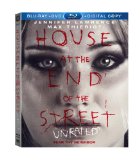| Reviews & Columns |
|
Reviews DVD TV on DVD Blu-ray 4K UHD International DVDs In Theaters Reviews by Studio Video Games Features Collector Series DVDs Easter Egg Database Interviews DVD Talk Radio Feature Articles Columns Anime Talk DVD Savant Horror DVDs The M.O.D. Squad Art House HD Talk Silent DVD
|
DVD Talk Forum |
|
|
| Resources |
|
DVD Price Search Customer Service #'s RCE Info Links |
|
Columns
|
|
|
House at the End of the Street
Other // PG-13 // January 8, 2013
List Price: $39.99 [Buy now and save at Amazon]
The Film:
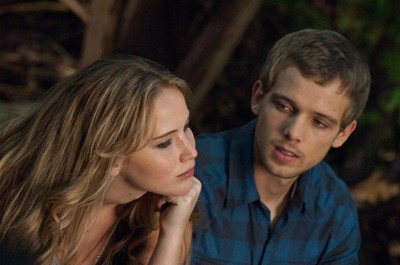 The girl moves into a new house down the street; the boy, a dubious pariah with a secret about his past, earns her interest. She contemplates riding home in his car or whether to enter his house or not, then bickers with her protective parent as they grow closer -- and, eventually, it all unravels in a blur of tension, confusion, and danger. House at the End of the Street is a defiantly derivative horror-thriller burdened by those bulk-purchase tropes that even mildly-seasoned genre enthusiasts will find stale, a pastiche of ideas recontextualized by tweaked incentives and moral ambiguity in a warmed-over package. The only thing separating Mark Tonderai's film from direct-to-video fare is Jennifer Lawrence, in a year when she's expertly realized both an off-kilter mental depressive and a storied bow-wielding heroine from a popular series of novels, and even she's limited in her capacity to add novelty to what's playing out. This is one of those genre films where it's hard to decide whether nosedived ambition or by-the-numbers dullness is, on the whole, less-satisfying.
The girl moves into a new house down the street; the boy, a dubious pariah with a secret about his past, earns her interest. She contemplates riding home in his car or whether to enter his house or not, then bickers with her protective parent as they grow closer -- and, eventually, it all unravels in a blur of tension, confusion, and danger. House at the End of the Street is a defiantly derivative horror-thriller burdened by those bulk-purchase tropes that even mildly-seasoned genre enthusiasts will find stale, a pastiche of ideas recontextualized by tweaked incentives and moral ambiguity in a warmed-over package. The only thing separating Mark Tonderai's film from direct-to-video fare is Jennifer Lawrence, in a year when she's expertly realized both an off-kilter mental depressive and a storied bow-wielding heroine from a popular series of novels, and even she's limited in her capacity to add novelty to what's playing out. This is one of those genre films where it's hard to decide whether nosedived ambition or by-the-numbers dullness is, on the whole, less-satisfying.
After an abrasive flashback intro full of jostled nighttime colors and bloody feathers, House at the End of the Street catches up with Elissa (Lawrence) and her single mother, Sarah (Elisabeth Shue), on the day they move into a new house. It's a large, beautiful place in the middle of a secluded rural forest, a spot the mother-daughter pair could only afford due to the sordid history of the other house that's nearby; both parents to a brother and sister were murdered there several years prior. Under the presumption that nobody would be living in the house, Elissa and her mother get settled into their new environment -- her mother, a doctor, takes a position at a local hospital; Elissa acclimates to a new high-school -- where they attempt to build the relationship they never really had beforehand. One night, a light flickers across the way, and they discover that the son, Ryan (Max Thieriot), still occupies the place. Elissa, someone who gravitates to "damaged" people, can't seem to resist the urge to get to know him.
The focus falls on Ryan in House at the End of the Street, pivoting on his mental state and whether it's wise for Elissa to associate with the troubled outcast. While the mystery aspects make their presence known early on -- something else is going on at Ryan's house -- director Tonderai handles the tone and plausibility almost as a practical examination instead of a horror or suspense film, an attempt at faint genre versatility that ultimately sinks. Conversations arise about Ryan's stability and Elissa's compulsion to "fix" people during the mother-daughter "bonding", forming an authentic backbone to the lead-up, but the stilted dialogue between shallow characters proves too heavy a burden to support. More importantly, this illusion of quasi-believability and a message of embracing strangers feels out-of-place with the audience instinctively keeping their guards up, since, y'know, the film's branded as a thriller about fearing what's going on in the house next door. It's conflicted, unfocusedly so, like a warped take on Hitchcock's Psycho in terms of trusting someone suspected of being unhinged.
Jennifer Lawrence's presence in House at the End of the Street is, in a word, frustrating among the hollow, perfunctory material. Her wide-eyed glances, defiant magnetism, and inherent virtue all stir in Elissa, much in the same way they do in her more substantive roles; her hikes through the wooded areas easily remind one of her desperation in those brisk stomps through the Ozarks in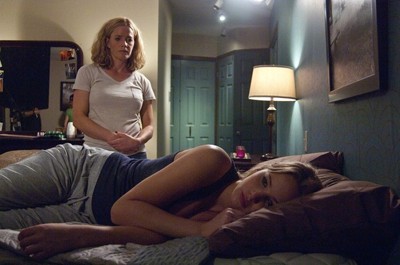 Winter's Bone, while her youthful nervousness echoes that of her early role in The Burning Plain. But there's not much of a character here for Lawrence to flesh out, comprised of little more than inconsistent outcast traits driven to sweat, jolt, and screech on cue, garnished with an occasional bit of character development -- she's a singer, she's assertive, she takes on people as projects -- to embolden her presence. Elissa's bond with her mother, which should be a central feature given the importance of the family angle, also doesn't really work; the anemic script and absent chemistry between Elisabeth Shue and Lawrence instead reduce heart-to-hearts and squabbles into token moments that merely shoo the plot forward.
Winter's Bone, while her youthful nervousness echoes that of her early role in The Burning Plain. But there's not much of a character here for Lawrence to flesh out, comprised of little more than inconsistent outcast traits driven to sweat, jolt, and screech on cue, garnished with an occasional bit of character development -- she's a singer, she's assertive, she takes on people as projects -- to embolden her presence. Elissa's bond with her mother, which should be a central feature given the importance of the family angle, also doesn't really work; the anemic script and absent chemistry between Elisabeth Shue and Lawrence instead reduce heart-to-hearts and squabbles into token moments that merely shoo the plot forward.
Perhaps those issues could be ignored for the sake of popcorn-munching chills, watching a talented it-actress get swept up in suspense, had House at the End of the Street managed to follow through with that side of the coin in a far-less derivative fashion. Despite a clear effort to do otherwise, Mark Tonderai leads the audience into bland, bloodless tedium that rarely generates more than faint alarming squirms at the strangeness of Ryan's overarching situation, where twists and revelations we've all seen before lethargically force their way between the forest separating the two houses. Jerky camera movement and brusque editing attempt to gruff up the atmosphere, which they do, but it comes across more like a maneuver to dress up the lack of authentic suspense until its sequence of momentous "gotcha!" reveals -- echoes of far-better horror films, languidly applied in a different perspective. That'll make it vanish into the ether of forgotten bland horror, but, thankfully, it assuredly won't be taking its lead actress with it.
The Blu-ray:
Fox Home Video scare up both the theatrical and unrated cuts of House at the End of the Street for this Blu-ray release, presented in a eco-friendly two-disc case with a sharp matte slipcover adorning the outside. The difference between the two, however, is marginal: 1:40:45 for the theatrical cut, and 1:41:46 for the unrated. Both appear on Disc One, while Disc Two is a DVD/Digital Copy presentation.
Video and Audio:
Mark Tonderai hooks up with Pontypool cinematographer Miroslaw Baszak for a intentionally thick, tonally obvious visual tempo for House at the End of the Street, and Fox's steady track record of dutiful high-definition representations persists in the 2.35:1-framed 1080p treatment. Harshness is intended here: thick grain emphasizes the coarse intended attitude layered over Elissa's movement through houses and in the woods, adding an intriguing dimension to the warmth of daylight orange-yellows and the cool, deep blues and greens as the sun goes down. Contrast becomes an important factor there, of course, which the Blu-ray navigates with mostly-successful responsiveness; a few green-tinged and wishy-washy moments only mildly hamper the overall presence of darker scenes in the woods and on lonely streets. Fine details in garments and grimy textures are present but infrequent, but that doesn't really matter in the constantly-moving camerawork. Certainly not a demo disc, but it's a success.
The 5-channel Master Audio track runs parallel to the visual quality, where the design underscores token knee-jerk thriller elements and intense dialogue for its more prominent success. The sounds of car doors shutting, the strumming of Lawrence's guitar, the pouring of rain and the rumble that accompanies "a struggle" spice up the picture with mundane but satisfying aggressiveness, occasionally falling flat and sounding thin. The shifts from hushed and loud dialogue, and how they interact with the twitchy ambience and fluctuation in score, is the arena where the audio treatment finds its strongest qualities: Things like the over-the-top musical jolt that happens when the light turns on in the neighboring house for the first time tests the clarity and punch of the track, which it does among well-handled stillness. It's a forgettable treatment, really, much like the movie itself, but it shoulders the design across the finish line with enough energy.
Special Features:
Outside of a Theatrical Trailer (2:28, HD), the only supplement made available for House at the End of the Street is a press-kit assembly feature entitled Journey Into Terror (9:59, HD) that features interviews and clips from the film for a quick making-of experience. Despite its briefness, the featurette concisely emphasizes Jennifer Lawrence's magnetism to the project, Mark Tonderai's perspective, the story's Hitchcockian origin and the components of grief and restrained horror in the picture.
Final Thoughts:
You've seen the bits-'n-pieces comprising House at the End of the Street in several other, better horror films, pieced together into a watered-down PG-13 horror-suspense replica about the weight of grief and leaps of faith in trusting troubled outcasts. While there's a dash of moral complexity there that I could admire, Mark Tonderai's effort lacks tension, ingenuity, and the ability to properly utilize a talent such as Jennifer Lawrence in its stead -- to which she fruitlessly elevates the central role she plays with her inbuilt persona. The scares are unfortunately dulled, and the revelations waiting on the other side of the cutain-pull are both familiar and oddly ineffective for being as thematically forceful as they are. The chance to see Lawrence navigate the genre might incline some to give this a one-time spin, and the Blu-ray provides a great way of doing so, but even her performance doesn't offer enough to justify the time spent here. Skip It.
Thomas Spurlin, Staff Reviewer -- DVDTalk Reviews | Personal Blog/Site
 The girl moves into a new house down the street; the boy, a dubious pariah with a secret about his past, earns her interest. She contemplates riding home in his car or whether to enter his house or not, then bickers with her protective parent as they grow closer -- and, eventually, it all unravels in a blur of tension, confusion, and danger. House at the End of the Street is a defiantly derivative horror-thriller burdened by those bulk-purchase tropes that even mildly-seasoned genre enthusiasts will find stale, a pastiche of ideas recontextualized by tweaked incentives and moral ambiguity in a warmed-over package. The only thing separating Mark Tonderai's film from direct-to-video fare is Jennifer Lawrence, in a year when she's expertly realized both an off-kilter mental depressive and a storied bow-wielding heroine from a popular series of novels, and even she's limited in her capacity to add novelty to what's playing out. This is one of those genre films where it's hard to decide whether nosedived ambition or by-the-numbers dullness is, on the whole, less-satisfying.
The girl moves into a new house down the street; the boy, a dubious pariah with a secret about his past, earns her interest. She contemplates riding home in his car or whether to enter his house or not, then bickers with her protective parent as they grow closer -- and, eventually, it all unravels in a blur of tension, confusion, and danger. House at the End of the Street is a defiantly derivative horror-thriller burdened by those bulk-purchase tropes that even mildly-seasoned genre enthusiasts will find stale, a pastiche of ideas recontextualized by tweaked incentives and moral ambiguity in a warmed-over package. The only thing separating Mark Tonderai's film from direct-to-video fare is Jennifer Lawrence, in a year when she's expertly realized both an off-kilter mental depressive and a storied bow-wielding heroine from a popular series of novels, and even she's limited in her capacity to add novelty to what's playing out. This is one of those genre films where it's hard to decide whether nosedived ambition or by-the-numbers dullness is, on the whole, less-satisfying. After an abrasive flashback intro full of jostled nighttime colors and bloody feathers, House at the End of the Street catches up with Elissa (Lawrence) and her single mother, Sarah (Elisabeth Shue), on the day they move into a new house. It's a large, beautiful place in the middle of a secluded rural forest, a spot the mother-daughter pair could only afford due to the sordid history of the other house that's nearby; both parents to a brother and sister were murdered there several years prior. Under the presumption that nobody would be living in the house, Elissa and her mother get settled into their new environment -- her mother, a doctor, takes a position at a local hospital; Elissa acclimates to a new high-school -- where they attempt to build the relationship they never really had beforehand. One night, a light flickers across the way, and they discover that the son, Ryan (Max Thieriot), still occupies the place. Elissa, someone who gravitates to "damaged" people, can't seem to resist the urge to get to know him.
The focus falls on Ryan in House at the End of the Street, pivoting on his mental state and whether it's wise for Elissa to associate with the troubled outcast. While the mystery aspects make their presence known early on -- something else is going on at Ryan's house -- director Tonderai handles the tone and plausibility almost as a practical examination instead of a horror or suspense film, an attempt at faint genre versatility that ultimately sinks. Conversations arise about Ryan's stability and Elissa's compulsion to "fix" people during the mother-daughter "bonding", forming an authentic backbone to the lead-up, but the stilted dialogue between shallow characters proves too heavy a burden to support. More importantly, this illusion of quasi-believability and a message of embracing strangers feels out-of-place with the audience instinctively keeping their guards up, since, y'know, the film's branded as a thriller about fearing what's going on in the house next door. It's conflicted, unfocusedly so, like a warped take on Hitchcock's Psycho in terms of trusting someone suspected of being unhinged.
Jennifer Lawrence's presence in House at the End of the Street is, in a word, frustrating among the hollow, perfunctory material. Her wide-eyed glances, defiant magnetism, and inherent virtue all stir in Elissa, much in the same way they do in her more substantive roles; her hikes through the wooded areas easily remind one of her desperation in those brisk stomps through the Ozarks in
 Winter's Bone, while her youthful nervousness echoes that of her early role in The Burning Plain. But there's not much of a character here for Lawrence to flesh out, comprised of little more than inconsistent outcast traits driven to sweat, jolt, and screech on cue, garnished with an occasional bit of character development -- she's a singer, she's assertive, she takes on people as projects -- to embolden her presence. Elissa's bond with her mother, which should be a central feature given the importance of the family angle, also doesn't really work; the anemic script and absent chemistry between Elisabeth Shue and Lawrence instead reduce heart-to-hearts and squabbles into token moments that merely shoo the plot forward.
Winter's Bone, while her youthful nervousness echoes that of her early role in The Burning Plain. But there's not much of a character here for Lawrence to flesh out, comprised of little more than inconsistent outcast traits driven to sweat, jolt, and screech on cue, garnished with an occasional bit of character development -- she's a singer, she's assertive, she takes on people as projects -- to embolden her presence. Elissa's bond with her mother, which should be a central feature given the importance of the family angle, also doesn't really work; the anemic script and absent chemistry between Elisabeth Shue and Lawrence instead reduce heart-to-hearts and squabbles into token moments that merely shoo the plot forward. Perhaps those issues could be ignored for the sake of popcorn-munching chills, watching a talented it-actress get swept up in suspense, had House at the End of the Street managed to follow through with that side of the coin in a far-less derivative fashion. Despite a clear effort to do otherwise, Mark Tonderai leads the audience into bland, bloodless tedium that rarely generates more than faint alarming squirms at the strangeness of Ryan's overarching situation, where twists and revelations we've all seen before lethargically force their way between the forest separating the two houses. Jerky camera movement and brusque editing attempt to gruff up the atmosphere, which they do, but it comes across more like a maneuver to dress up the lack of authentic suspense until its sequence of momentous "gotcha!" reveals -- echoes of far-better horror films, languidly applied in a different perspective. That'll make it vanish into the ether of forgotten bland horror, but, thankfully, it assuredly won't be taking its lead actress with it.
The Blu-ray:
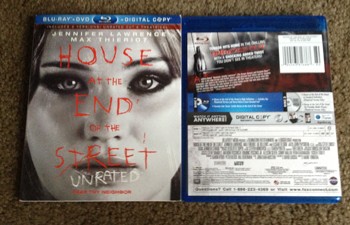 | 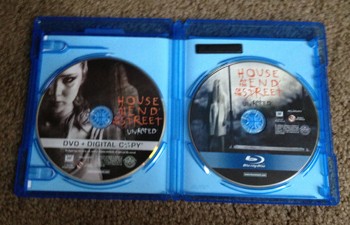 |
Fox Home Video scare up both the theatrical and unrated cuts of House at the End of the Street for this Blu-ray release, presented in a eco-friendly two-disc case with a sharp matte slipcover adorning the outside. The difference between the two, however, is marginal: 1:40:45 for the theatrical cut, and 1:41:46 for the unrated. Both appear on Disc One, while Disc Two is a DVD/Digital Copy presentation.
Video and Audio:
Mark Tonderai hooks up with Pontypool cinematographer Miroslaw Baszak for a intentionally thick, tonally obvious visual tempo for House at the End of the Street, and Fox's steady track record of dutiful high-definition representations persists in the 2.35:1-framed 1080p treatment. Harshness is intended here: thick grain emphasizes the coarse intended attitude layered over Elissa's movement through houses and in the woods, adding an intriguing dimension to the warmth of daylight orange-yellows and the cool, deep blues and greens as the sun goes down. Contrast becomes an important factor there, of course, which the Blu-ray navigates with mostly-successful responsiveness; a few green-tinged and wishy-washy moments only mildly hamper the overall presence of darker scenes in the woods and on lonely streets. Fine details in garments and grimy textures are present but infrequent, but that doesn't really matter in the constantly-moving camerawork. Certainly not a demo disc, but it's a success.
The 5-channel Master Audio track runs parallel to the visual quality, where the design underscores token knee-jerk thriller elements and intense dialogue for its more prominent success. The sounds of car doors shutting, the strumming of Lawrence's guitar, the pouring of rain and the rumble that accompanies "a struggle" spice up the picture with mundane but satisfying aggressiveness, occasionally falling flat and sounding thin. The shifts from hushed and loud dialogue, and how they interact with the twitchy ambience and fluctuation in score, is the arena where the audio treatment finds its strongest qualities: Things like the over-the-top musical jolt that happens when the light turns on in the neighboring house for the first time tests the clarity and punch of the track, which it does among well-handled stillness. It's a forgettable treatment, really, much like the movie itself, but it shoulders the design across the finish line with enough energy.
Special Features:
Outside of a Theatrical Trailer (2:28, HD), the only supplement made available for House at the End of the Street is a press-kit assembly feature entitled Journey Into Terror (9:59, HD) that features interviews and clips from the film for a quick making-of experience. Despite its briefness, the featurette concisely emphasizes Jennifer Lawrence's magnetism to the project, Mark Tonderai's perspective, the story's Hitchcockian origin and the components of grief and restrained horror in the picture.
Final Thoughts:
You've seen the bits-'n-pieces comprising House at the End of the Street in several other, better horror films, pieced together into a watered-down PG-13 horror-suspense replica about the weight of grief and leaps of faith in trusting troubled outcasts. While there's a dash of moral complexity there that I could admire, Mark Tonderai's effort lacks tension, ingenuity, and the ability to properly utilize a talent such as Jennifer Lawrence in its stead -- to which she fruitlessly elevates the central role she plays with her inbuilt persona. The scares are unfortunately dulled, and the revelations waiting on the other side of the cutain-pull are both familiar and oddly ineffective for being as thematically forceful as they are. The chance to see Lawrence navigate the genre might incline some to give this a one-time spin, and the Blu-ray provides a great way of doing so, but even her performance doesn't offer enough to justify the time spent here. Skip It.
|
| Popular Reviews |
| Sponsored Links |
|
|
| Sponsored Links |
|
|
| Release List | Reviews | Shop | Newsletter | Forum | DVD Giveaways | Blu-Ray | Advertise |
|
Copyright 2024 DVDTalk.com All Rights Reserved. Legal Info, Privacy Policy, Terms of Use,
Manage Preferences,
Your Privacy Choices | |||||||









